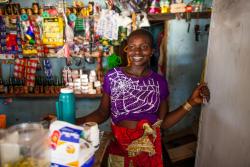- عربي
- 中文
- English
- Français
- Русский
- Español
Previous Programmes of Action
The UN System’s efforts to reverse LDCs’ increasing marginalization in the global economy and put them on a path to sustained growth and development dates to the 1960s.
In the late 1960s, the UN began to pay special attention to the LDCs, recognizing those countries as the most vulnerable among the international community. The International Development Strategy for the second UN Development Decade for the 1970s incorporated special measures in favour of the LDCs.
Substantial New Programme of Action for LDCs - 1981
In order to generate international attention and action to reverse the continuing deterioration of the socio-economic condition of the most vulnerable countries, the First United Nations Conference on the LDCs was held in Paris in 1981. It adopted a comprehensive Substantial New Programme of Action for LDCs over the coming decade with the aim to transform LDC economies and enable them to provide minimum standards of nutrition, health, housing and education as well as job opportunities to their citizens, particularly to the rural and urban poor.
Paris Declaration and Programme of Action for the Least Developed Countries - 1990
The Second Conference on the Least Developed Countries (LDC-II) reviewed the socio-economic progress made in the 1980s as well as progress in international support measures during that decade. At LDC-II, the international community committed itself to urgent and effective action, based on the principle of shared responsibility and strengthened partnership, to arrest and reverse the deterioration in the socio-economic situation in the least developed countries and to revitalize their growth and development. The priority areas for the decade ahead were: macroeconomic policy; human resources development; reversing the trend towards environmental degradation and reinforcing action to address disasters; rural development and food production; and the development of a diversified productive sector.
Brussels Programme of Action - 2001
The Programme of Action for LDCs for the Decade 2001-2010 aimed to improve living conditions in the LDCs and provided a framework for partnership between LDCs and their development partners to accelerate sustained economic growth and sustainable development, to end marginalization by eradicating poverty, inequality and deprivation in these countries, and to enable them to integrate beneficially into the global economy. The overarching goal of the Programme of Action was to make substantial progress toward halving the proportion of people living in extreme poverty and suffering from hunger by 2015 and promote the sustainable development of the LDCs.
The United Nations Office of the High Representative for Least Developed Countries, Landlocked Developing Countries and Small Island Developing States (UN-OHRLLS) was established by General Assembly Resolution 56/227 following LDC-III to ensure effective follow-up, implementation, monitoring and review of the implementation of the Brussels Programme of Action.



